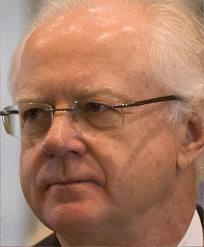According to the Australian Broadcasting Corporation, Japanese authorities are now admitting the crisis at the Fukushima nuclear plant in March may have been worse than a core meltdown.
 In an official report that will go to the UN’s nuclear watchdog, the International Atomic Energy Agency (IAEA) set up in 1957, Japan now says nuclear fuel in three reactors possibly melted through several pressure vessels and into the earth below. This type of event, called a melt-through, is the worst outcome in a nuclear accident.
In an official report that will go to the UN’s nuclear watchdog, the International Atomic Energy Agency (IAEA) set up in 1957, Japan now says nuclear fuel in three reactors possibly melted through several pressure vessels and into the earth below. This type of event, called a melt-through, is the worst outcome in a nuclear accident.
GOSHI HOSONO, SPECIAL ADVISOR TO JAPANESE PM (Translation): At present there is damage to the bottom of the reactor container, we call this ‘core melting’ in English. Part of the nuclear fuel has fallen onto the dry earth floor and it’s possible that it’s still lodged there.
TETSURO FUKUYAMA, GOVERNMENT SPOKESMAN (Translation): Hot spots were found, meaning there were certain spots with very high readings of radiation.
According to atomic experts, this is about as serious as it gets in a nuclear disaster. Dangerous levels of radioactive iodine and cesium have already contaminated the sea, the soil, groundwater, and the air.
This week plutonium was detected for the first time outside the stricken plant, and Strontium-90, known as a bone seeker because it can cause bone cancer and leukemia, has now been found as far away as 37 miles from the facility.
In a draft report to the IAEA, Japan admitted that it wasn’t prepared for the Fukushima meltdown. Further, it also acknowledged that its nuclear regulator was run by a ministry, which has been the chief promoter of nuclear energy for decades (sound like another nuclear regulatory agency that we know closer to home?).
In an NRC memo issued on Thursday – Subject: NRC MONITORED ALERT, FLOODING (and a FIRE!!!!) AT FORT CALHOUN NUCLEAR STATION (the portion in red are mine, the rest is the NRC’s memo).
The U.S. Nuclear Regulatory Commission Tuesday monitored conditions at the Fort Calhoun Station, located 19 miles north of Omaha, Neb. The plant, operated by Omaha Public Power District (OPPD), declared an Alert at 9:40 a.m. CDT.
The Alert was declared due to an indication of fire in the west switchgear room at 9:30 a.m. Automated fire suppression systems activated as expected and the fire was confirmed out at 10:20 a.m. OPPD exited the alert at 1:15 p.m. An “Alert” is the second lowest of four emergency classes. OPPD briefly activated its Emergency Operations Center (EOC) and the Joint Information Center (JIC).
For the duration of the event the NRC monitored developments from its incident response center at its Region IV office in Arlington, Texas, and received updates from the onsite NRC Inspectors. OPPD notified the states of Nebraska and Iowa.
There was no danger to the public of a radiation release because the plant has been shut down since early April for a refueling outage and remains in that condition (much like the Fukushima Dai-ichi units 4, 5, and 6). Although the plant briefly lost its normal ability to cool the spent fuel pool, temperatures in the pool remained at safe levels and the plant recovered pool cooling without the need for any of the plant’s multiple backup systems.
The licensee previously entered a Notice of Unusual Event due to the rising level of the Missouri River and some onsite flooding on June 6. Since that time, NRC has provided round the clock staffing with its Resident Inspectors and they will continue to remain on site and monitor the situation during the flood conditions.
Just last month, two US nuclear plants went into emergency shut down due to outside power loss and a fire in a switchyard adjacent to the plant when tornados tore through the Southeast. Neither of these two plants were hit directly by a tornado, which would have made containment of the situation much more difficult. But, scarely.one was discovered, just three months prior to the tornados, to have had issues for as long as nine months with their backup coolant system, which would have made the incident following the tornado much more dire.
The disaster in Japan has forced numerous countries to re-evaluate the safety of their nuclear fleet of power plants and their ability to respond to safety incidents compounded by natural disasters that make containment more difficult. Switzerland and Germany have made the decision to pursue other renewable energy sources and to phase out their nuclear units as their licenses come to their end.
As the US looks at three incidents, in three months associated with natural disasters
- unusual flooding,
- what is amounting to one of the most prolific and deadly tornado seasons this country has seen in decades, and
- a hurricane season that has just come upon us and is predicted to be an above average Atlantic hurricane season according to the most recent forecasts by the National Oceanic and Atmospheric Administration (NOAA) and the Colorado State University Tropical Meteorology Project (CSUTMP).
In the words of Clint Eastwood in Dirty Harry, “You’ve got to ask yourself one question: ‘Do I feel lucky?’ Well, do ya punk?”
Read Full Post »








